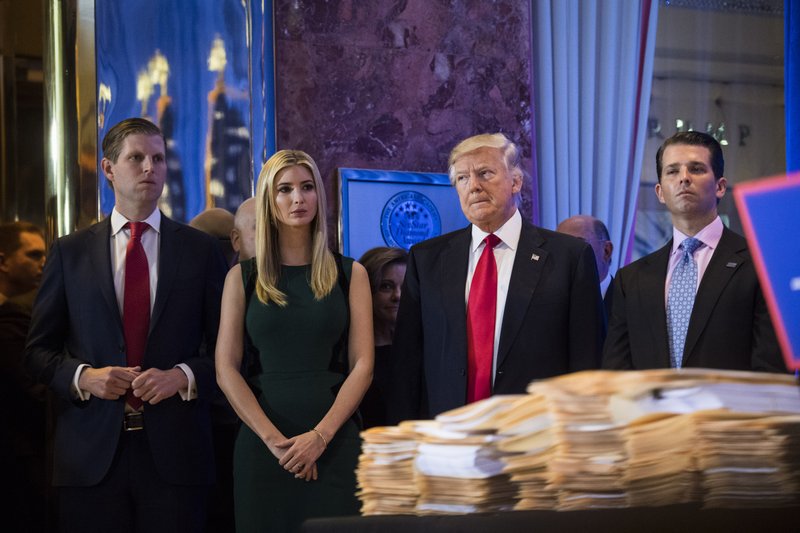The New York attorney general filed suit against President Donald Trump and his three eldest children Thursday, alleging "persistently illegal conduct" at the president's personal charity, saying Trump repeatedly misused the nonprofit organization -- to pay off his businesses' creditors, to decorate one of his golf clubs and to stage a multimillion-dollar giveaway at his 2016 campaign events.
In the suit, filed Thursday morning, Attorney General Barbara Underwood asked a state judge to dissolve the Donald J. Trump Foundation. She asked that its remaining $1 million in assets be distributed to other charities and that Trump be forced to pay at least $2.8 million in restitution and penalties.
Underwood said that oversight of spending at Trump's foundation was so loose that its board of directors hadn't met in 19 years.
Instead, she said, the foundation came to serve the spending needs of Trump, and then, in 2016, the needs of his presidential campaign. She cited emails from Trump campaign staff members, directing which charities should receive gifts from the Trump Foundation, and in what amounts.
Underwood also asked that Trump be banned from leading any other New York nonprofit organization for 10 years, seeking to apply a penalty usually reserved for the operators of small-time charity frauds to the president of the United States.
But she asked the judge to go further, and require Trump to pay millions more. While such foundations are supposed to be devoted to charitable activities, the petition asserts that Trump's was often improperly used to settle legal claims against his various businesses, even spending $10,000 on a portrait of Trump that was hung at one of his golf clubs.
"This resulted in multiple violations of state and federal law," she wrote in the legal complaint.
Underwood was promoted to attorney general only weeks ago, succeeding Democrat Eric Schneiderman after he resigned after allegations that he had physically abused several romantic partners.
In tweets Thursday morning, Trump suggested that the lawsuit was politically motivated.
"The sleazy New York Democrats, and their now disgraced (and run out of town) A.G. Eric Schneiderman, are doing everything they can to sue me on a foundation that took in $18,800,000 and gave out to charity more money than it took in, $19,200,000. I won't settle this case!" he wrote, adding: "Schneiderman, who ran the Clinton campaign in New York, never had the guts to bring this ridiculous case, which lingered in their office for almost 2 years. Now he resigned his office in disgrace, and his disciples brought it when we would not settle."
The $10,000 portrait was one of several examples of the foundation being used in "at least five self-dealing transactions," according to the attorney general's office, violating tax regulations that prohibit using nonprofit charities for private interests.
In 2007, to settle a dispute between the city of Palm Beach and Trump's Mar-a-Lago resort, the foundation paid $100,000 to the Fisher House Foundation, another charity.
In 2012, a man named Martin Greenberg sued the Trump National Golf Club after he made a hole-in-one at a fundraising golf tournament that had promised to pay $1 million to golfers who aced the 13th hole, as he did. As part of a settlement, the charitable foundation paid $158,000 to a foundation run by Greenberg.
The foundation also paid $5,000 to one organization for "promotional space featuring Trump International Hotels," and another $32,000 to satisfy a pledge made by a privately held entity controlled by Trump to a charitable land trust.
The Trump Foundation has no employees. On Thursday, Amanda Miller, a spokesman for Trump's company, responded on its behalf. She echoed Trump's assertion that this was a politically driven lawsuit, saying: "This is politics at its very worst."
Three of Trump's adult children -- Donald Trump Jr., Ivanka Trump and Eric Trump -- also were named in the lawsuit because they have been official board members of the foundation for years. Under the law, Underwood said, board members are supposed to scrutinize a charity's spending for signs that its leader --in this case, their father-- was misusing money.
The sleazy New York Democrats, and their now disgraced (and run out of town) A.G. Eric Schneiderman, are doing everything they can to sue me on a foundation that took in $18,800,000 and gave out to charity more money than it took in, $19,200,000. I won’t settle this case!...
— Donald J. Trump (@realDonaldTrump) June 14, 2018
....Schneiderman, who ran the Clinton campaign in New York, never had the guts to bring this ridiculous case, which lingered in their office for almost 2 years. Now he resigned his office in disgrace, and his disciples brought it when we would not settle.
— Donald J. Trump (@realDonaldTrump) June 14, 2018
But in reality, Underwood wrote, the three Trump children exercised no such oversight. The board had not met since 1999.
Underwood asked the judge to ban each of the three from serving as a director of a New York nonprofit organization for a year. It was not clear whether any of the three are serving on the board of any such charities. Eric Trump, for instance, stepped down from the board of the Eric Trump Foundation after the 2016 election, and the charity was renamed Curetivity.
Information for this article was contributed by David A. Fahrenthold of The Washington Post; and by Danny Hakim of The New York Times.
A Section on 06/15/2018
